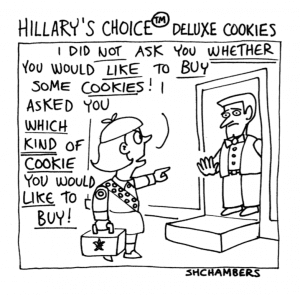Early January saw Clinton and McCain win their respective party primaries in New Hampshire; but a more important development for some libertarians came a few days before those votes. The New Republic magazine published a major hit piece on Republican presidential candidate Rep. Ron Paul. The implication was that Paul is a bigot – racist, antigay, and a antisemitic. The evidence was excerpts from a number of articles that appeared in several newsletters that Paul published or was otherwise involved with during the 1980s and early 1990s. The excerpts were selective, of course. But some of the quotations are troubling:
Order was only restored in L.A. [after the 1992 “Rodney King” riots] when it came time for the blacks to pick up their welfare checks three days after rioting began….
. . . opinion polls consistently show only about 5% of blacks have sensible political opinions….
… I miss the closet …. Homosexuals, not to speak of the rest of society, were far better off when social pressure forced them to hide their activities.

Not all of this was news. In October 2001, Paul told Texas Monthly magazine that he had not written the offending articles but acknowledged a “moral responsibility” for the barmy things published in his name. Still, The New Republic (despite several highly-publicized instances of fiction presented as fact in its pages) remains an influential publication in establishment media circles. So, the story may hurt Paul’s candidacy.
Paul polled about 10% of votes in the New Hampshire GOP primary. That, combined with his early successes rais- ing money, suggests that he could run a credible campaign through the GOP convention in a few months. For those of us interested in hearing a voice for principled limited govern- ment, that credibility is important.
Ron Paul isn’t likely to win the nomination. But he could influence the debate on issues from the Iraq War to so-called health care “reform.” And he could mark a trail for other libertarian candidates to follow in the GOP. If he’s marginalized as a crackpot bigot, these good ends will be lost.
It’s a reality of the libertarian movement that some crackpots have mingled in our midst. The same can be said of any political movement; oddballs are often drawn to the intensity that political discourse can generate.
Some of liberty’s crackpots are conspiracy theorists. Their opposition to statism and establishment par- ties comes not from philosophical resolve but from neurotic fixations on chimeras like “the organized power of the gay lobby” and “mostly black welfare recipients” – language that the recent article sourced to Paul newsletters.
Classical liberalism is better than this. And Paul seems to realize it. His official response reads:
The quotations in The New Republic article are not mine and do not represent what I believe or have ever believed. I have never uttered such words and denounce such small-minded thoughts.
The rest of the spring will tell how much a closer scrutiny of past writings will affect Paul’s candidacy. The best case will be that he brings the term “libertarian” a little closer to the political mainstream without tarnishing it.

